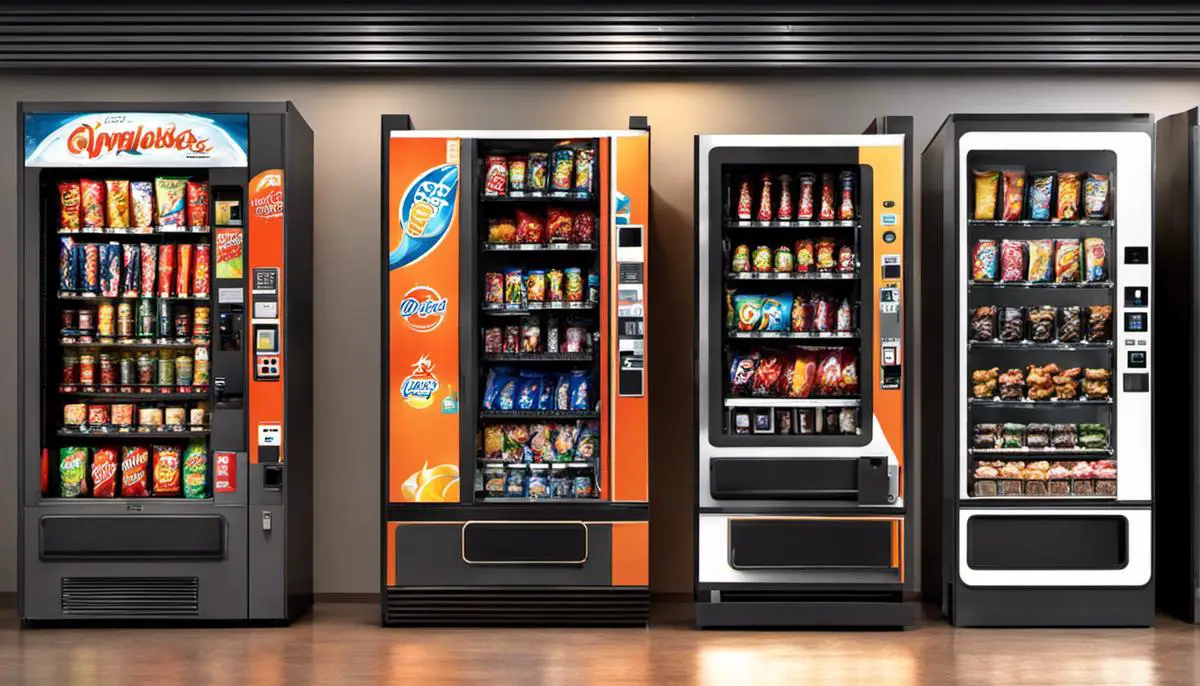The vending machine business is an often overlooked, yet potentially lucrative investment prospect. The simple operation, varied types, and diverse products range from these automated retailers present unique opportunities for both start-ups and established businesses. Notably, with minimal human intervention, this venture offers a unique prospect for passive income. This engaging discussion delves into several salient aspects of starting and running a successful vending machine business, ranging from understanding the operational nuts and bolts, to unraveling the cost-profit matrix, to selecting the right location and competition, tackling risk factors and challenges, and finally drawing inspiration from notable success stories in this sector.
Understanding Vending Machine Business
Understanding the Vending Machine Business
The vending machine industry operates by providing consumers with quick and convenient access to a wide variety of products. These automated machines are traditionally placed in strategic high-traffic areas like shopping malls, schools, hospitals, office buildings, and public transportation hubs to reach the maximum number of potential customers. The key to success in this business is location, product selection, and efficient operations management.
Types of Vending Machines
There are essentially two main types of vending machines: bulk vending machines and full line vending machines. Bulk vending machines generally dispense inexpensive items like gumballs, candies, stickers, and small toys. Full line vending machines dispense a wider range of products including beverages, snacks, sandwiches, and even electronic gadgets. In the recent years, smart vending machines with features like touch screens, cashless payment options, internet connectivity, and advanced machine learning algorithms have also emerged and are growing in popularity.
Common Goods Sold
The range of goods sold through vending machines vary widely depending on its type and location. Snacks and drinks like candy bars, chips, sodas, and water are among the most common items found in traditional vending machines. However, there are also machines that sell healthier options like salads, fruit, and yogurt. Some specific locations such as airports and train stations may also have vending machines that sell commonly forgotten items like chargers, headphones, and travel size toiletries.
In more novel implementations, vending machines have even been utilized to sell high-ticket items like electronics or unique goods like art and luxury fashion products. The variety of vending machine offerings continues to grow as businesses seek to leverage the convenience and efficiency of this sales channel.
Vending Machine Industry Market
According to Grand View Research, the global vending machine market size was valued at USD 30.3 billion in 2018 and is expected to register a CAGR of 9.4% from 2019 to 2025. Factors like increasing demand for on-the-go snacks, drinks, and cigarettes due to hectic lifestyle, rising inclination towards self-service formats due to technological advancements in vending machines, and the cost-efficient business model of vending machine operations are driving the market growth.
Another key market trend observed is that vending machine operators are progressively using remote management systems to manage their machine inventories, save on operational costs, and increase profitability. To meet the evolving consumer expectations, vending machine operators are also diversifying their product offerings and providing cashless payment options.
An Overview of Vending Machine Investment
Investing in vending machines can potentially offer lucrative returns due to their relatively low maintenance costs and high potential for revenue, particularly in locations with substantial foot traffic. This kind of investment typically implies acquiring the vending machines, coordinating lease agreements for lucrative locations, and ensuring appropriate stock maintenance. Profitability hinges on a combination of factors, including the pricing and popularity of the items sold, the pedestrian traffic volume, upkeep costs, and leasing expenses.
However, it’s crucial to acknowledge that all forms of businesses come with their associated risks. In the case of vending machine operations, issues such as market oversaturation, machine malfunctions, vandalism, or variances in location foot traffic may significantly impact revenues. It is, therefore, pivotal for prospective investors to undertake comprehensive market research, business planning, and financial evaluation before immersing themselves in this business venture.
Investing In Vending Machines
Investing in vending machines is a potential way to generate passive income, own your own business, and diversify your portfolio. Vending machines are devices that dispense various products, such as snacks, drinks, toys, or electronics, to customers who pay with cash or cards. They are widely used in locations like schools, offices, malls, airports, or hotels.
There are many benefits of investing in vending machines. Firstly, the startup and maintenance costs are low. You can start with a relatively low investment and find used or refurbished machines that are cheaper. Maintenance costs are minimal, as you only need to restock them regularly and fix minor issues.
Secondly, vending machines offer high profit margins. They operate 24/7 and require no employees or rent, resulting in steady income. Profit margins vary depending on the product, location, and demand, but can range from 25% to 50% or more.
Thirdly, vending machine businesses are flexible and scalable. You can choose products and niches that suit your preferences and adjust prices and promotions to increase sales and profits. Starting with a few machines, you can expand as you grow your customer base and network.
Investing in vending machines is also eco-friendly and socially responsible. Buying used or refurbished machines recycles them and prevents landfill waste. Offering healthy snacks or specialty products provides convenience and value to customers.
However, there are challenges and risks involved. Finding the right location with high foot traffic and negotiating agreements with property owners is crucial. Vandalism and theft are concerns, so securing machines and insuring them is important. Complying with laws and regulations, obtaining licenses and permits, and meeting health and safety standards are necessary.
To start a vending machine business, choose the type of machine, find suitable locations, source reliable sellers, stock inventory, explore financing options, and invest in tools like vending management software and repair kits.
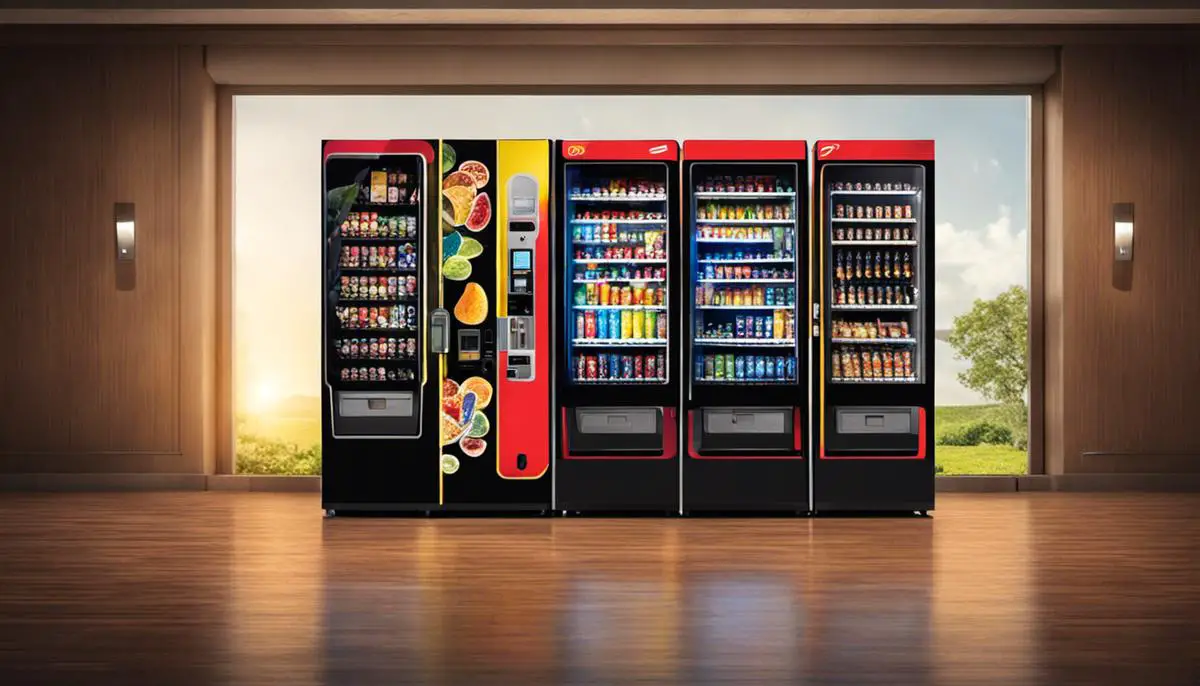
Profitability and Cost Analysis
Estimating Initial Investment Costs for a Vending Machine Business
Starting a vending machine business demands an upfront investment, with the final amount considerably hinging on the number, type, and quality of the machines that an investor decides to purchase or lease. Initial costs can vary dramatically. For instance, simple bulk candy machines might range from $50 to $200 per unit. Mid-range snack-vending machines could cost in the ballpark of $2,000 to $3,000 per unit. On the other hand, high-end vending machines possessing advanced features like touch screens and credit card facilities can even go up to $6,000 each.
Replenishment and Maintenance Costs
Apart from the initial investment on the equipment, the vending machine business also involves recurring costs. These include costs associated with replenishing the machines with products, and maintaining and repairing the machines. The cost of the products would depend on what products you decide to offer. For instance, selling snacks and drinks would require a different inventory cost compared to selling toys or novelty items. Regular maintenance and occasional repairs are to be expected, whether you hire a service or handle these tasks yourself.
Operational and Licensing Costs
Running the vending machine business also incurs operational costs. These may include fuel for driving to different locations to restock machines, insurance to protect against theft or damage, and licensing fees to comply with local ordinances and regulations. Licensing fees can vary from as little as $15 to a few hundred dollars per machine annually. The cost will depend largely on the state where the business operates.
Potential Revenue
The revenue generated by a vending machine business depends on a number of factors including location, the number of machines, the types of inventory, and the frequency of restocking. High-traffic areas often yield more profits, but such locations may also demand higher rental fees. It has been estimated that a single vending machine can generate between $20 to $100 per week. However, these numbers can vary significantly depending on the factors mentioned earlier.
Profitability Outlook
Comparing costs and potential revenue gives a picture of the expected profitability of investing in a vending machine business. Balancing the costs of machine purchase or lease, restocking, maintenance, and licensing against the potential revenue can give an indication of return on investment. Given the estimates, a single vending machine could bring in $1,000 to $5,000 in revenue per year. Deducting the various costs, a conservative estimate of net annual profit for a single vending machine could range from a few hundred to a couple of thousand dollars.
Navigating the world of vending machine businesses can be a potentially profitable venture if careful management and strategic placement are implemented. The low operation costs paired with the opportunity for passive income make this an appealing investment for those willing to dedicate the necessary time and effort. It’s crucial to bear in mind that the success of this kind of business heavily relies on effective cost management and the strategic location of your vending machines.
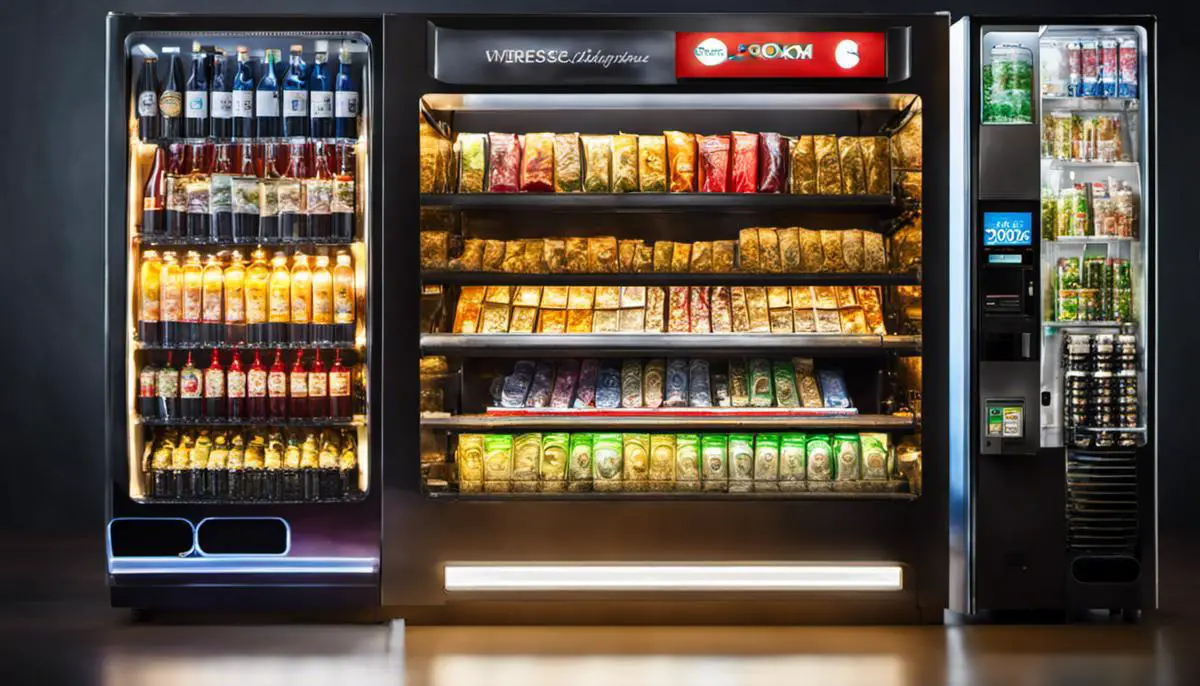
Location and Competition
Grasping the Vital Role of Location in Vending Machine Investments
The decision of where to place your vending machine can mark the difference between just breaking even or generating a substantial income. Hence, the choice of location plays a pivotal role when estimating your vending machine revenues.
Areas of high foot traffic like industrial zones, universities, hospitals, airports, shopping centers, and hotels offer potentially beneficial locations for your vending machine business. Conducting in-depth demographic research on the types of individuals frequenting these areas can provide valuable insights into the most suitable products for your vending machine.
Consider important factors such as average age, gender, lifestyle, and income level when exploring possible locations. For instance, areas predominantly visited by students and younger folks might be ideal for vending machines dispensing snacks, beverages, or small novelty items. On the other hand, upscale or boutique hotels may be more fitting for vending machines offering premium or locally sourced products.
Staying ahead in the Vending Machine Business Competition
In the highly competitive world of vending machines, understanding the nature of the game and implementing unique strategies can set you apart. Choosing to curate your offerings to your particular customer base is an excellent approach to handle the stiff competition.
Setting your vending machine amidst others calls for a unique vending strategy. For example, provide a fresh perspective to conventional offerings like water and soda – think health drinks, locally sourced snacks, or vegan and gluten-free options that your competition might lack. Catering to a unique audience can certainly put you on the competitive high ground.
Key to outmaneuvering competition also lies in maintaining your machines well and providing stellar customer service. Machines that are cleaned and restocked regularly, and are coupled with excellent service, are bound to attract repeated patronage. You could also consider the incorporation of digital updates like credit card readers, mobile payment availability, and interactive touchscreens to make your machines more engaging for the tech-savvy.
Last but not least, forging strong partnerships can be the secret sauce to winning the competition in this industry. Teaming up with local businesses could open doors to mutually beneficial scenarios. For example, local food joints might be interested in selling their products in your vending machines. Such partnerships add a unique flavor to your offerings, setting you apart from competition.

Risk Factors and Challenges
Understanding Risks: Machine Downtime, Evolving Consumer Behavior and Vandalism Issues
Investing in vending machines does invite certain risks. The machines’ unreliable nature can sometimes lead to unwanted breakdowns, channeling your profit margin into repair costs. Additionally, consistent maintenance checks, despite preventing damages, can be both time-consuming and costly.
Moreover, potential vandalism and theft must be factored in. Vending machines, especially those stationed in low traffic or unguarded areas, could become targets for burglars and vandals. This could lead to losses due to stolen goods or damages to the machine, implicating additional repair or replacement costs.
Lastly, the fickle nature of consumer behavior is an ever-present risk. Investing wisely includes anticipating that consumer trends might shift, and what’s trending today could be history tomorrow. This uncertainty in consumer behavior could directly influence your vending machine’s sales and, consequently, its profitability.
Challenges: Location, Products, and Regulatory Compliance
Location selection is critical in the vending machine business. High-traffic areas tend to provide the best return on investment. Yet, they often come with higher rent charges. Plus, it’s important to ensure that your products match the needs and preferences of the people frequenting those locations.
Another hurdle for investors can be choosing the right product mix. While popular items like snacks and drinks can garner consistent sales, there’s increasing demand for healthy options, innovative products, and localized offerings. Balancing the need for popular products with innovative ones is key to remaining competitive.
Regulatory compliance can present additional challenges. Vending machines are subjected to a variety of local, state, and federal regulations. These can include laws around where machines can be placed, what products can be sold, and how products should be labeled. Navigating this regulatory landscape may require additional resources and expert advice.
Economic Instability and Competition
In times of economic instability, discretionary income may decrease, directly impacting sales. Furthermore, in a tough economy, vandalism and theft from machines generally increase.
Vending machine industry is heavily competitive. As an investor, you’ll need to contend with established, large vending machine operators. These competitors will be equipped with economies of scale and robust distribution networks. These are elements that a new investor would need to gradually develop.
Insurance costs are also worth considering. Vending machines require insurance to cover potential damages or lawsuits. These premiums can be costly, especially for new investors with limited cash flow.
To navigate through the intricate world of vending machine investments, one should be equipped with extensive knowledge of the market, potential risks, and a preventive strategic plan. The myriad of challenges and opportunities paints a convoluted picture of risks and rewards, thus it is essential for investors to exercise caution and undertake a comprehensive analysis before diving into this venture.
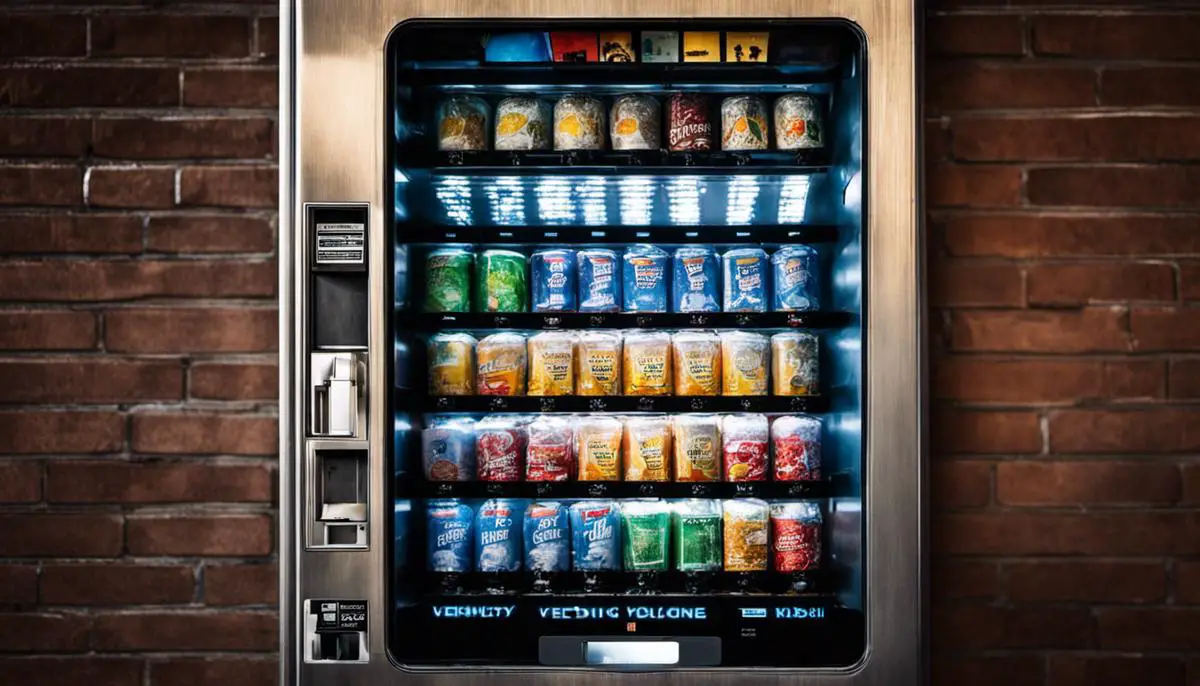
Success Stories and Case Studies
Case Study: Charting Jeff Marsh’s Path in the Vending Machine Sector
When Jeff Marsh, a seasoned professional in sales and marketing, decided to venture into the vending machine industry, he identified an untapped niche. He noticed the lack of healthy options in traditional vending machines, which mainly dispensed junk food and soda.
Capitalizing on this observation, Marsh founded Grow Healthy Vending in 2008, with a vision to deliver healthy snacks and beverages through vending machines. He used cutting-edge technology for seamless card payments and efficient remote inventory management in his machines.
Over time, Marsh’s unique idea blossomed. After a decade, Grow Healthy Vending has successfully inaugurated over 100 franchises nationwide and installed more than 5000 machines in various locations like schools, gyms, offices, and health centers. His story epitomizes success derived from thoughtful investing and strategic planning in the vending machine industry.
Case Study: Coca-Cola’s Innovative Approach to Vending Machine Business
Coca-Cola has been at the forefront of vending machine innovation for decades. In the 80s, they successfully implemented temperature-sensitive vending machines, meaning when the temperature rises, the drink price rises slightly, too. This idea was initially met with skepticism, but it turned out to be profitable and successful.
More recently, Coca-Cola has started adopting AI technology in their vending machines. These machines can suggest personalized options based on the customer’s past choices, weather conditions, and time of day. This innovative idea has helped create a personalized vending experience and increase sales.
Success Story: Redbox’s Disruptive Approach
In 2002, McDonald’s Corporation launched a new venture named Redbox. The idea was simple – to rent DVDs through vending machines. They installed the machines at McDonald’s outlets to test market response. The idea was successful and spun off into a separate company in 2005.
Redbox succeeded because they understood their customers’ need for convenience and affordable entertainment options, leading to over 41,500 kiosks across the U.S. They utilized state-of-the-art software to manage inventory, determine efficient locations for their kiosks, and even predict which movie titles were likely to be top performers.
Case Study: Vengo Labs Combines Vending and Digital Advertising
Vengo Labs spotted an opportunity to disrupt the traditional vending machine industry by blending the vending machine business with digital advertising. Their compact machines sell a variety of products, from health and beauty products to electronics while displaying advertisements on a digital screen when not in use.
Vengo partners with top brands for the content displayed on the machines, creating a dual revenue stream—sales from the products and income from the advertising. Their targeted approach to vending has seen them secure contracts with gyms, colleges, and hotels, carving a niche within a highly competitive industry. They have installed over 1,400 machines in numerous high-traffic locations nationwide so far.
Each of these success stories and case studies shares a common factor—innovation. Whether it’s offering healthier snack options or combining vending with digital advertising, breaking the mold seems to be a winning strategy in the vending machine sector. Investors keen on pursuing vending machine businesses are encouraged to think outside the box and consider non-traditional tactics.
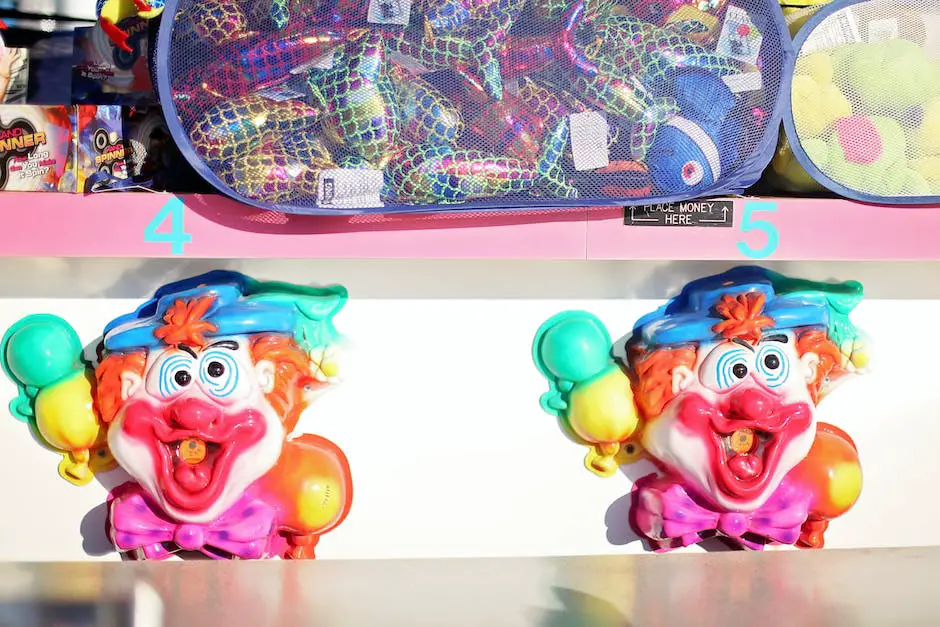
Treading into the realm of the vending machine business is certainly a journey replete with opportunities and challenges. An informed understanding of the market, astute strategic decisions, and resilience in the face of risks can pave the way to a successful venture.
Conclusion
As we’ve seen through the success stories, it’s those who maneuver effectively through the intricate landscape of this business who reap the benefits. The diverse experiences and insights shared in this discourse lay a robust foundation for aspiring investors, equipping them with the knowledge to form a practical and promising business blueprint in the vending machine industry.

